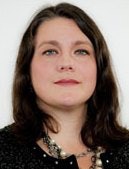 Kelly Hannum, director of global research insights at the Center for Creative Leadership in Greensboro, N.C., says family members can be the source of discouragement for female leaders in higher education.
Kelly Hannum, director of global research insights at the Center for Creative Leadership in Greensboro, N.C., says family members can be the source of discouragement for female leaders in higher education.A recent study of top female college and university leaders finds that although there are lots of glimmers of optimism, female higher education administrators still face subtle barriers such as being held to different expectations than male counterparts, some lack of support, discouragement and sometimes sabotage. The findings of the study were released earlier this month following a summit of female higher education executives convened by Human Education Resource Services, a Denver-based organization that provides leadership training to women seeking to rise to top leadership positions in higher education The study, which was conducted by HERS, was the culmination of about two years of work. The study, which received support from TIAA-CREF, was carried out in conjunction with the Center for Creative Leadership and the University of Colorado at Colorado Springs. Researchers interviewed 35 female senior-level administrators at a variety of colleges and universities, including community colleges, specialized colleges and HBCUs. Of the 35 interviewees, 15 were presidents or chancellors, 10 were vice presidents or vice chancellors and five were provosts. The others held a variety of senior administrative titles such as chief diversity officer, treasurer or dean. Twenty of the interviewees were White; the others were women of color. “The two barriers most mentioned were discouragement and sabotage and different expectations for men and women,” says Kelly Hannum, director of global research insights at the Center for Creative Leadership in Greensboro, N.C. “Discouragement and sabotage were small things people would do to discourage women from seeking high levels of leaderships. Some of the discouragement came from places you might not expect ― like a family member saying, ‘You have a great job! Why would you want to move up?’” Hannum says many of the participants in the study reported that they felt they were held to different expectations than males, particularly when it came to attendance at certain public events. “The women in the sample felt there was a greater expectation on them to attend those functions and serve on committees whereas it wasn’t seen as necessary for men in the same roles,” she says. Adds Dr. Judith White, president and executive director of HERS: “People have a sense that women have to justify why they would go for leadership role, which puts them in a bind. The other [issue] has to do with women carrying out the social work of the job. The president’s husband is not an acceptable sub in some roles while the president’s wife is. Women can’t be too tough or not nice.” Hannum says this same kind of double standard manifests itself in other arenas in the workplace or sometimes in the process of applying for the job. “Some of it also comes up in terms of family roles,” she says, alluding to the fact that women executives are more likely to be asked about family responsibilities. “Men are rarely asked that. That’s not something men would typically have to address as part of their candidacy.” She says women leaders also face higher levels of criticism, and that this is particularly true for women of color. Both Hannum and White say the study echoes themes found in research on women’s experience in leadership positions. They also say that in spite of these barriers, there’s much cause for optimism. “One of the wonderful implications is that these women did overcome these barriers and found support,” says White. “It was often overcome by someone who found encouragement.” She says another implication of the study’s findings highlights a need for institutions to be more systematic about helping women overcome barriers and other challenges. “Institutions have to attentive to expectations they continue to leave unchallenged,” she says. “They have to be attentive to these differences in expectations.” Dr. Daisy Cocco De Filippis, president of Naugatuck Valley Community College in Waterbury, Conn., a Dominican American, says she’s had several experiences in other administrative jobs where colleagues or subordinates underestimated her. She surprised them, she says, by rising to the challenge, displaying a high level of competence and when necessary taking them on. “It was powerful to me to go this event and see women who have overcome and are in positions of influence,” says DeFilippis. “Do we need to double or triple that? Yes.” But she says the progress that has been made by women in her nearly 40 years in higher education has been remarkable. She advises younger women who aspire to leadership opportunities in higher education to do a couple of things. “First find someone you can talk with who is older and more experienced. Find a good mentor,” she says. “Men do that really well. Second, understand that you’ve got to take a chance. Be a risk taker.”


















